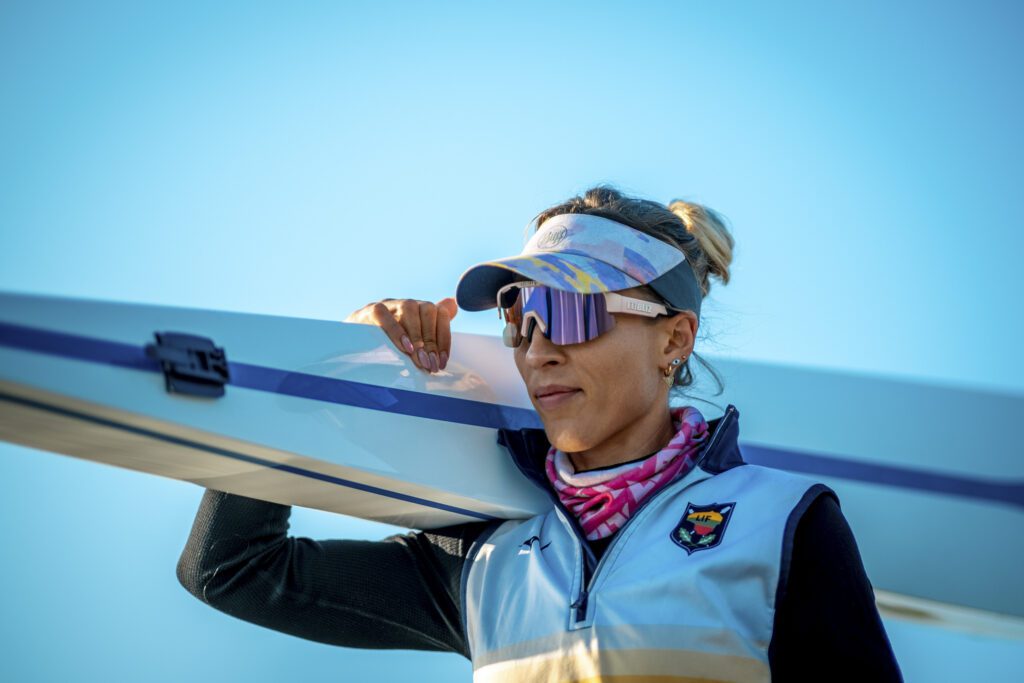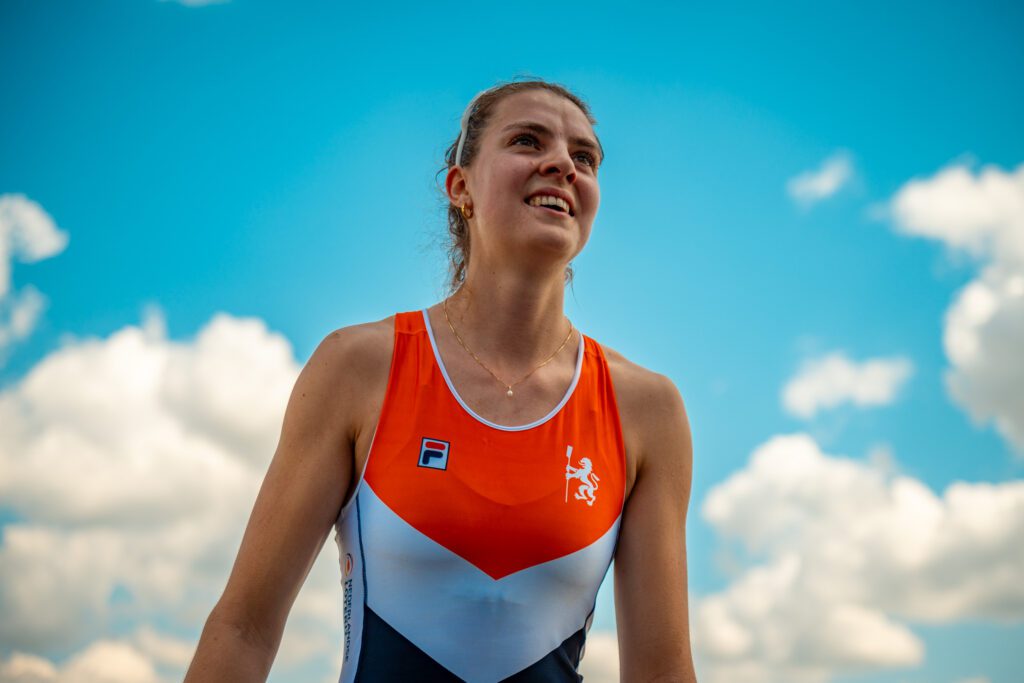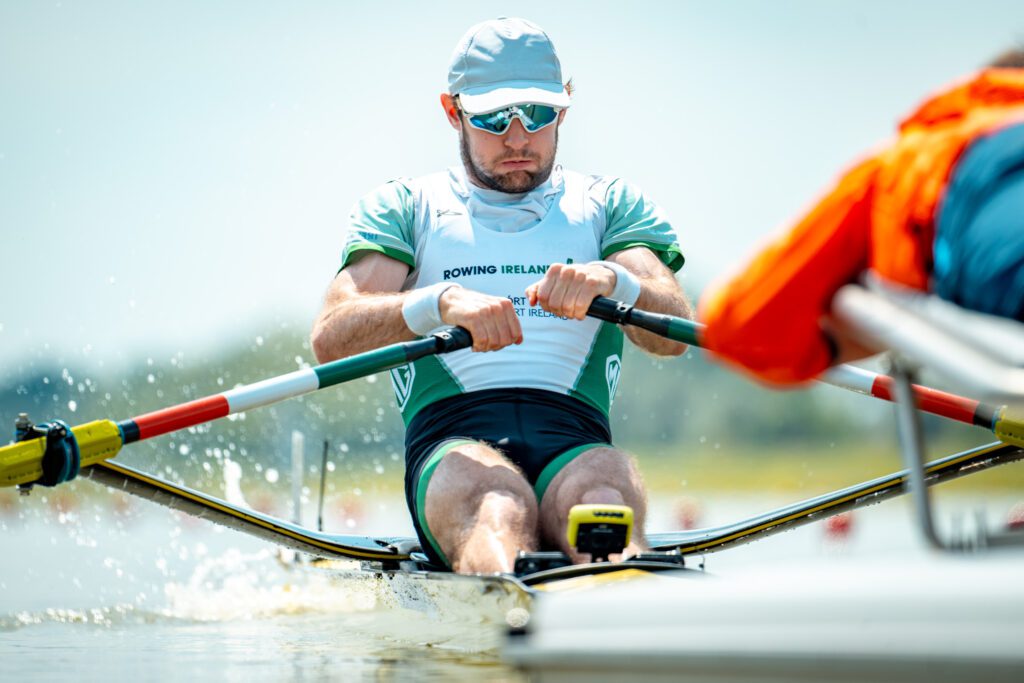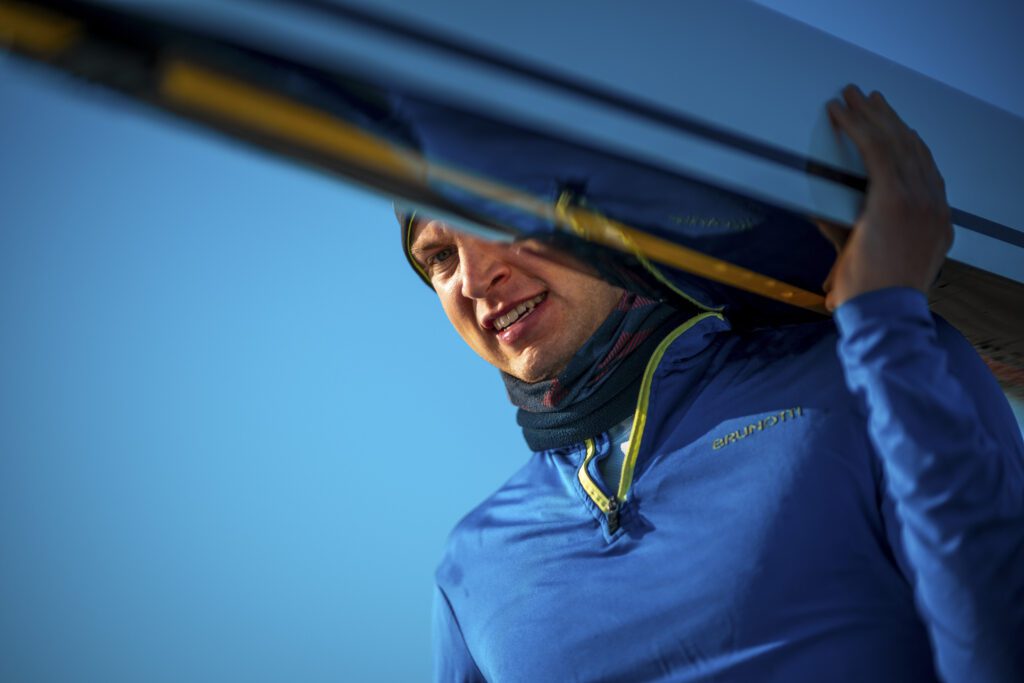Sunday in Varese dawned hazy and bright, water flat as a pancake and the distant ice-covered Zermatt peaks which back onto the Matterhorn glistening in the sunlight, 70km away from the lake. The ice would have been welcome, as the day ended in sweltering conditions, the rowers coming in streaming with sweat to collect their medals after being out under the Lombardian sun for an hour and racing like fury.
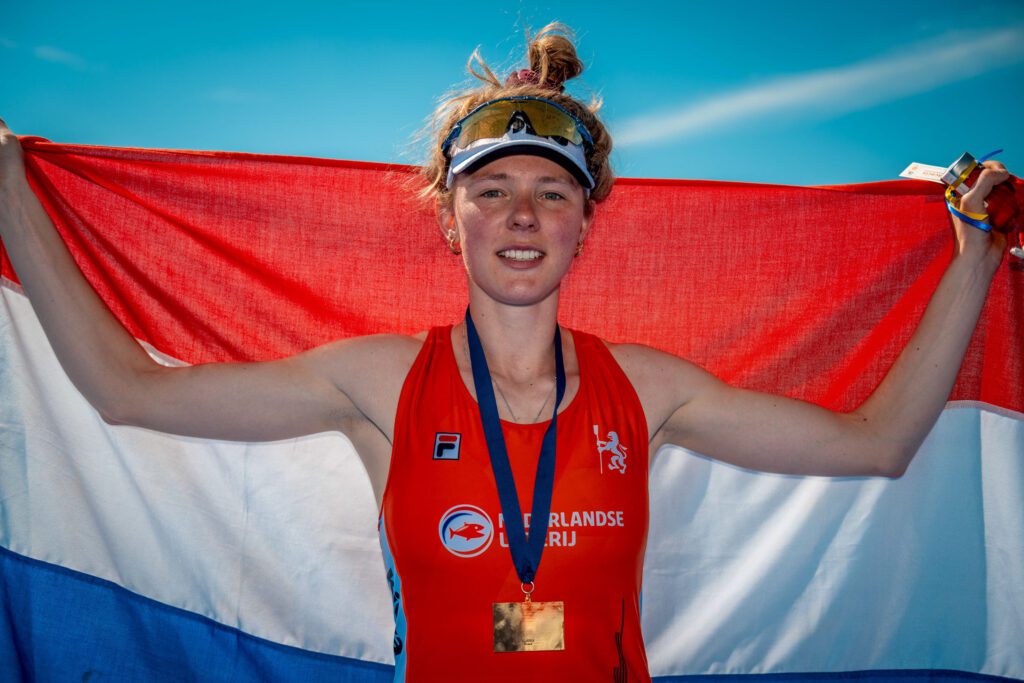
Photo NED W1x
Credit Benedict Tufnell
Row360 coverage of the 2024 World Rowing Cup Series
Top of the pack overall were the Dutch and British, with five golds apiece, though the Dutch could claim a moral victory since all five of theirs were in Olympic categories to Britain’s four, putting them fractionally ahead on World Cup points. Now the Dutch squad will go back on training camps before making an appearance at Lucerne and, then, the 2024 Games. Hosts Italy were also in fine form, fielding crews for their unqualified Paris slots which had genuine speed, and some of which caught more experienced combinations napping.
The singles crowns stayed firmly on the heads of their 2023 champions, Olli Zeidler (GER) and Karolien Florijn (NED), but it has to be mentioned that there were plenty of people missing. As well as the Australian contingent being largely their development group, the same was true of the Romanian women, very much missed in the pairs, doubles, fours and eights. In addition the Irish lightweights are on a different training cycle from their openweights, but the lighties will be turning up in Szeged at the Europeans in ten days time.
So, on to the racing, and the pairs showed tactics in play straight away, launching the A-finals with a boom. Ireland’s Alice Keogh and Fiona Murtagh rattled the cages of world champions Veronique Meester and Ymkje Clevering (NED) when they launched an all-out assault on the defending champions from 1km gone. The sustained Irish burst took them from fifth to second in a remarkably short time, after which they closed hard on the leaders, just running out of lake by a few strokes. Denmark, who have only qualified the men’s single for the Olympics, were out to make a statement which they achieved with third place. “We’ve had some tough races against the Irish, so it’s good to start the season a little bit under pressure,” said Meester. “Hopefully we can build up from here.”
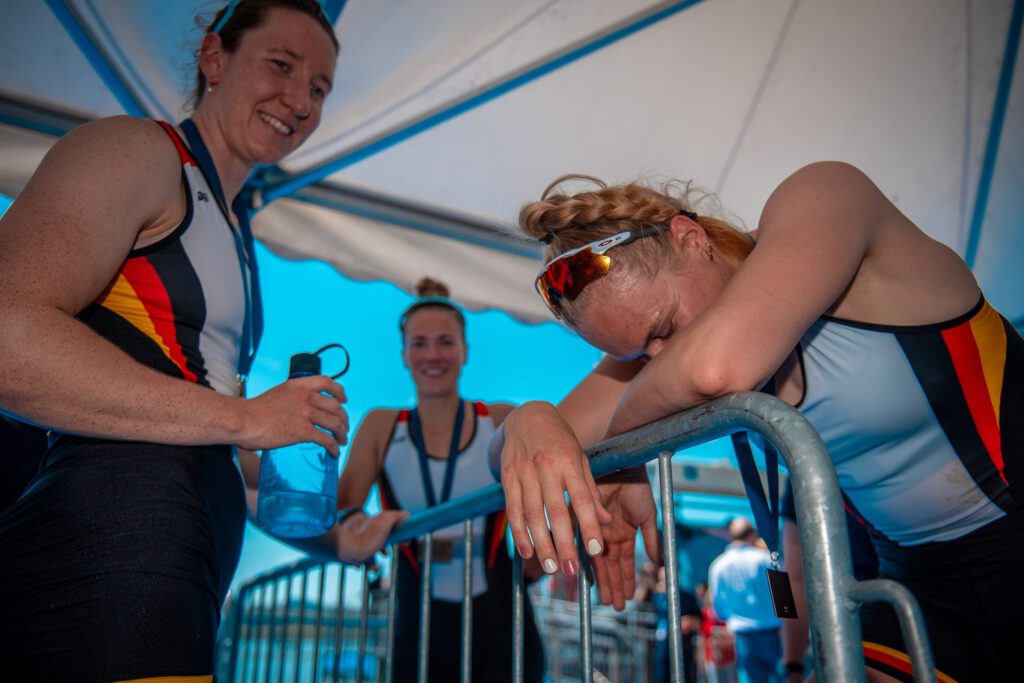
Photo Post race recovery
Credit Benedict Tufnell
The men’s pairs was even more interesting, the Danish M2- of Frederic Vystavel and Joachim Sutton back together after their Tokyo bronze medal. Sutton retired after that, but rowed the Pacific with friends which got him back into the sport just in time to pick up his rowing career again the year before the Olympics. The duo put on a great start despite this being their first 2km race of the year, and shot off like bullets followed closely by the Sinkovic brothers from Croatia, holding the lead for half the course before Britain’s Ollie Wynne-Griffith and Tom George pushed through, followed by their world champion rivals Switzerland, who couldn’t quite close the gap to the British by the line. Meanwhile the Sinkovic pairs project looks to be in trouble as they ended a relatively distant fourth. With their double ending eighth — Patrik and Anton Loncaric, who were in the pair last year — it looks as if the boat-swapping trick hasn’t quite produced the hoped-for speed in any department. But both are already qualified for Paris so they could easily switch back if they want to.
The bankers of the day, winning with enough clear water to convince sceptics that they are still on their 2023 champion form, were three women: Netherlands single sculling queen Karolien Florijn and lightweights Imogen Grant and Emily Craig from Britain. Florijn won majestically from Alexandra Foester while the W1x bronze went to this year’s new break-through act Inger Seim Kavlie from Norway who had finished 13th in the world championships last year, her first season in the lonesome boat. Grant and Craig similarly had over six seconds on their nearest challengers, whilst the LW2x minor medals saw Italy’s Olympic champions Valentina Rodini and Federica Cesarini win the home team seat-race from their team-mates Stefania Buttignon and Silvia Crosio by a mere 0.02 seconds, the slimmest margin of the regatta. “I don’t think anyone puts as much pressure on ourselves as we do,” said Grant. “Ultimately that can only be a positive thing. We don’t judge the race on where we come, we judge the race on how we are rowing.”
The lightweight men’s race saw Swiss scullers Jan Schaeuble and Raphael Ahumada Ireland initially having it all their own way in the absence of the Irish reigning world and Olympic champions, but then Gabriel Soares and Stefano Oppo (ITA) dumped the sprint of the century on the Swiss and pipped them to the line by 0.4 seconds. “So much fun, because we know the Swiss,” said Oppo. “In the heat I think they started low, but in the final they go faster and tried to go away. But we know this and tried to stay near until the last 500m, then go, go go.” “The Italians are pretty fast in the end, but we knew that,” said Ahumada. And the Irish? “Yes, [they are] the big elephant who’s not in the room at the moment but I think we’re gonna train hard and see what they do in the race.”
Row360 coverage of the 2024 World Rowing Cup Series
Five of the Italian medals came from this kind of eye-catching final sprint, including in the women’s eights (who won a tight battle with the British all the way along the course), and in the men’s doubles, where they edged Ireland into bronze. The most satisfying for them will have been the men’s four, their prime crew and top of the list wanting to qualify for Paris, who outfoxed the British world champions not once but twice in the weekend. Narked by having let the Italians get away on Friday the Brits tried to turn the tables on them, and it nearly worked as the British bow was ahead for 1950 metres before Italy sprinted like hell for the line. It’s not quite the result it seems, with the two crews on very different training cycles, but will give plenty for both crews to think about, and could get interesting if Italy do manage to grab Paris seats.
Italy’s Davide Mumolo also grabbed the home crowd’s attention with a blistering men’s singles attack which ended up taking the bronze spot off newly solo Brit George Bourne, behind a strong performance from Olli Zeidler (GER) and Dutchman Simon van Dorp while experienced Croat Damir Martin’s revived promise faded to sixth. “I needed to be a bit flexible today, because I expected Damir to be a bit more in front,” said Zeidler. “So I needed to change my race plan a bit.” He has a busy summer, with the Europeans, Lucerne and then Henley Royal coming up on the travel list.
Van Dorp’s level of trouble for Zeidler looks likely to carry on this year, after claiming 2023 world silver with a small enough margin to keep the German on his toes. Van Dorp described “long waves, like wake, which hit everyone so it was fair,” on Lake Varese, which was echoed later by the men’s eights, but that didn’t seem to bother him. Having a Dutchman who can race in multiple ways has probably helped Zeidler create that flexibility of mind and racing which he lacked in Tokyo. Whatever the outcome this season, single sculling has benefited from the Dutch high standard.
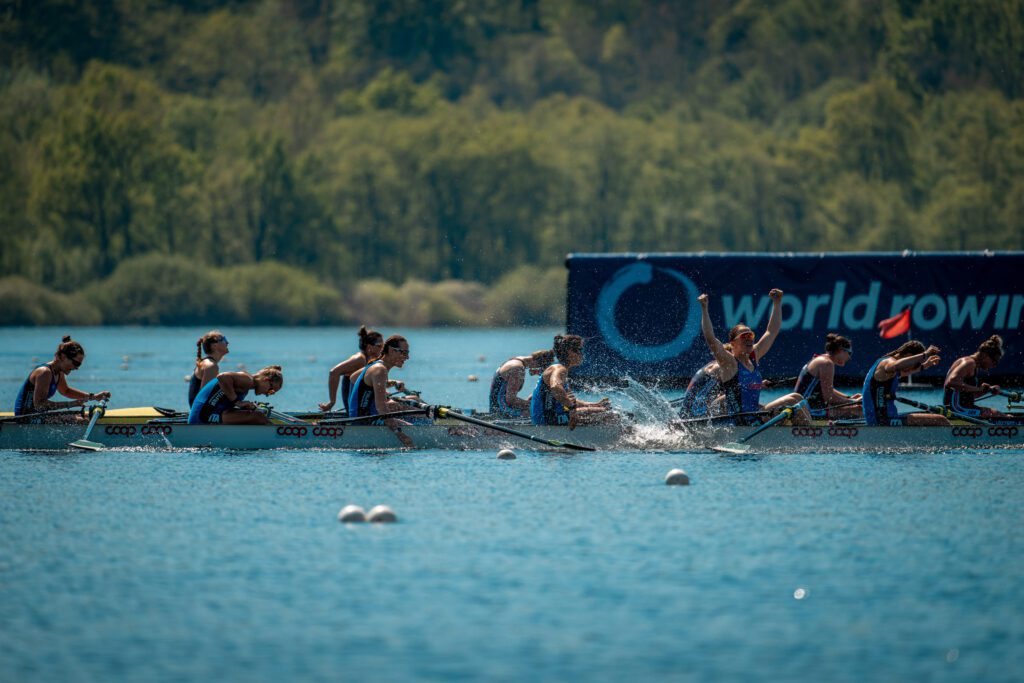
Photo ITA W8+
Credit Benedict Tufnell
That was also on show in the W2x, M2x and M4x, all of which ended up with gold medals gleaming against the orange Netherlands strip, albeit under challenge from other crews. Their only scullers who missed the gold boat were the women’s quad, caught out by a superb start and flying race from Ukraine, who gave the Dutch world runners-up too much to do to catch them. Ukraine haven’t yet qualified for the Paris Olympics, so this is a great start to the season for the team which has had to train in Spain and cannot ignore the damage being done by Russia’s assault on their nation. “We want to do everything for our country, which is now still in war and in a hard situation for two years,” said Nataliia Dovgodko.
The British double-up plan in the women’s was rather effective, the top two British W4- conquering an unconfident Dutch four, before the second and third GB fours combined to race the Italians in the eight. Here Italy had the upper hand, getting out far enough to make Britain try and claw it back, and able to just match every move enough to secure a gold.
The final race of the day saw Britain’s men’s eight keep their first place from last summer, holding the Dutch at arms length and even increasing the margin in the final strokes, to make a point. “We don’t assume anything, but at the same time that gives us a lot of confidence,” said Morgan Bolding (GBR). “We haven’t changed the crew but we’ve changed the seating order a little bit. We’re trying things out, new boat, new this and that, and it’s about keeping your heads while making those changes. We don’t see ourselves as the gold standard: we set a gold standard which is ahead of us and a bit unachievable to be honest, so as long as we’re striving for that, our standard relative to anyone else is irrelevant. We’ve identified ‘being the gold standard’ as a bad mindset to be in, so that’s not how we think.” “We all start from the start,” added Tom Digby. “You don’t get any bonuses for having won the race beforehand. If any complacency creeps in, this is the year of the Olympics, someone’s going to put their foot down and do something about that.”
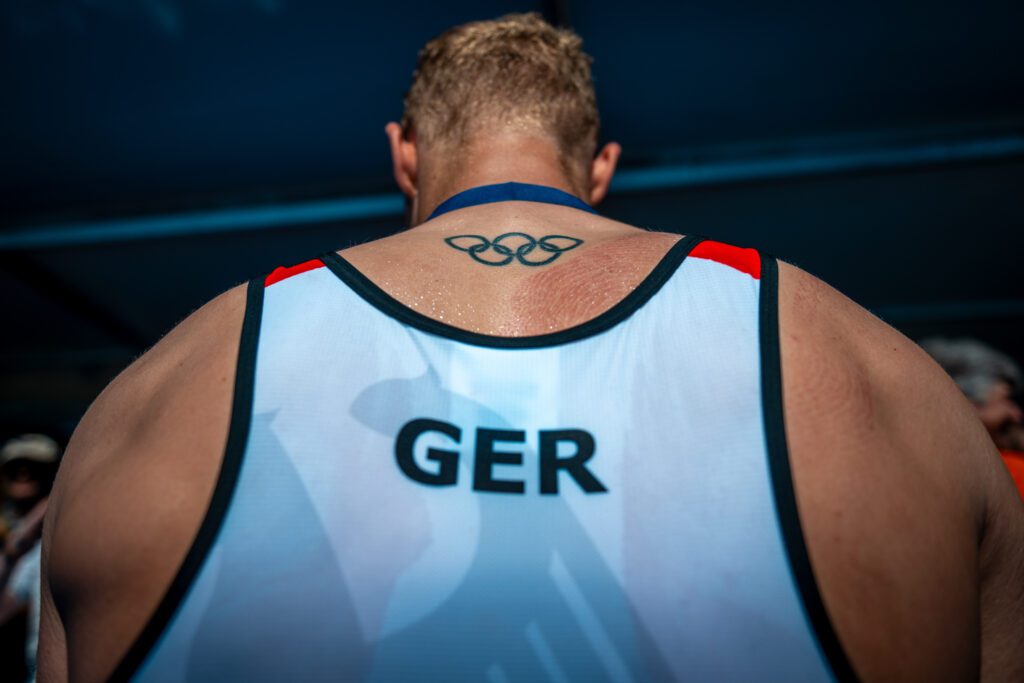
Photo GER M1x
Credit Benedict Tufnell
The next international all-comers regatta is in Szeged, a combination of the European Olympic and Paralympic Qualification Regatta (EOPQR) and the European Rowing Championships, which acts as a mini Euros-only World Cup. This will be a crunch regatta for qualifying singles and lightweight doubles, as anyone from Europe who doesn’t get to Paris via that regatta will have to go to the Final Qualifying Regatta three weeks later in Lucerne, along with the pairs, openweight doubles and bigger boats.
